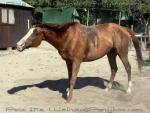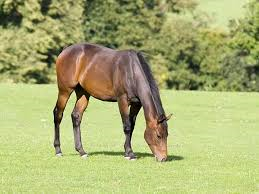Colic
 Colic is NOT a disease, but rather a collection of signs that should alert the vigilant owner to the fact that the horse is experiencing abdominal pain. The term "colic" is generally used to describe pain associated with the digestive tract and can range from mild discomfort to extremely severe pain. Colic should NEVER be ignored because many of the conditions that can cause colic are potentially life-threatening.
Colic is NOT a disease, but rather a collection of signs that should alert the vigilant owner to the fact that the horse is experiencing abdominal pain. The term "colic" is generally used to describe pain associated with the digestive tract and can range from mild discomfort to extremely severe pain. Colic should NEVER be ignored because many of the conditions that can cause colic are potentially life-threatening.
WHAT ARE THE SIGNS? Often identifying the signs of colic can be a major problem for the horse owner, as the signs can vary greatly between individuals and also depend upon the severity of the problem. There are many signs of colic - some of the most common include:
- Sweating
- Pawing at the ground
- Turning head towards the flank
- Kicking or biting at the abdomen
- Stretching out as if trying to urinate without doing so
- Continuously swishing the tail more than usual
- Walking around in circles
- Repeatedly getting up & lying down or attempting to do so

- Rolling on the ground
- Failing to shake when they get up from lying down
- Curling of the top lip
- Not eating or reduced appetite
- Increased or decreased gut sounds
- Change in the nature of the droppings
- Increased passing of wind

- Distension of the abdomen
- Increased heart & respiration rates
- Increased temperature
- Depression
WHAT TO DO? TAKE IMMEDIATE ACTION Timing can be critical in minimizing the impact of the colic and allowing it to be successfully treated either medically, or in more severe cases, by surgical intervention.
First put on personal protective equipment (PPE) as colic symptoms have been observed in Hendra virus cases.
OBSERVE THE SIGNS & NOTIFY YOUR VETERINARIAN IMMEDIATELY
- Behavioural (as above – pawing, kicking, rolling, sweating, depression)
- Digestive activity ie droppings or lack of them, passing wind

- Vital signs (temperature, heart & respiratory rates).
- Try to remember if there have been any changes if routine.
- Medical history (deworming, any past history of abdominal pain)
- Breeding history (Is it a pregnant mare?).
- Be aware of the insurance status and/or value of the horse.
- Remove feed until your veterinarian has made a diagnosis.
- If horse is rolling, put it on a lead and walk the horse around to help ease discomfort while waiting for your veterinarian.
DO NOT WALK THE HORSE UNTIL IT BECOMES EXHAUSTED.
- Do not endanger either yourself or others if the horse is behaving violently but wait for your veterinarian to arrive.
- Keep the horse as calm & comfortable as possible.
- Administer any medication the vet has advised but DO NOT administer drugs without advice as they may camouflage the problem and interfere with accurate diagnosis.
- Check the condition of your other horses as sometimes a change of feed can cause colic.
DIAGNOSIS / TREATMENT A veterinarian will assess the signs to diagnose and establish the severity of the colic. Your records of the signs (see above) will greatly assist this process. The veterinarian may pass a stomach tube to determine the presence of gas in the stomach and also perform a rectal palpation for any evidence of a blockage. Blood tests may also be taken to asses the degree of shock.
Treatment will vary depending on the nature of the colic, and your veterinarian will decide the appropriate course of action. Colic management will generally include pain relief and medications to aid in re-establishment of normal digestive function.
A horse with colic or undergoing treatment may refuse all its normal feeds but will often eat fresh green grass unless the colic is extremely severe.
REDUCING THE RISK
The unique anatomy of the horse digestive tract can predispose to colic, however good management can play a key role in colic prevention.
Establish a set routine for feeding and exercise - avoid sudden changes.
MANAGEMENT PRACTICES TO REDUCE THE RISK OF COLIC
- Feed a good quality diet composed mainly of roughage as the horse is an adaptive grazing animal. In its natural environment the horse will consume small quantities of feed over the entire day.
- Feed according to the amount of work and/or the horse’s condition eg. A horse in full work, a pregnant or lactating mare will need additional energy in the diet.
- Make dietary changes gradually. Introduce a new feed mixed with the existing diet over several days.
- Divide any concentrate food evenly through the daily feeds - preferably mixed with chaff. DO NOT feed one single feed of a large quantity of concentrated feed.
- Regular dental care
- Minimize confinement time (eg a stable or small yard)
- Provide fresh, clean water at all times (except immediately after strenuous exercise. When the horse is excessively hot when only small amounts should be offered).
- Check hay, bedding, pastures and the environment for any toxic substances (eg mould, poisonous plants, or any foreign material - hay twine, plastic bags etc).
- Avoid feeding off the ground on sandy soils or dirt / crusher dust yards - try to use feeders.
- Implement a regular worm control program - consult your veterinarian for advice.
- Any change in the intensity and duration of any exercise program should be undertaken gradually.
- Reduce stress where possible. Horses experiencing a dramatic change in environment or workload (eg. traveling long distances, at shows) are at high risk of digestive dysfunction.
- Maintain accurate management records of feed, parasite control and exercise regimes.

Fit & Healthy & Rearing to Go.....
IN SUMMARY - Any horse can be susceptible to colic, however with appropriate care and management, the diligent horse owner can minimize the risk and have a long and happy relationship with their horse.


